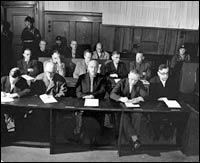A Tidal Shift in Global Politics
The Second World War gave way to the Cold War, and in June 1948, Soviet troops blockaded Berlin, which sat deep in the East German territory they controlled. America and its western allies responded with a massive airlift of supplies into beleaguered West Berlin. Even prior to the Berlin Airlift, America started to see West Germany as a potentially powerful ally against the Soviet Union.

German industrialists (IG Farben Trial). Photo: USHMM |
Prosecutor William Caming recalls the tidal shift in global politics hit Nuremberg like an artillery shell. With American politicians increasingly alarmed by the "Red Menace," Caming says pressure mounted on prosecutors to wrap up the trials.
Caming says: "We had visits from congressmen and senators who favored the re-armament of Germany and who said that we had to get rid of the trials because they're an obstacle."
An obstacle because German political and military leaders wanted the Nuremberg trials shut down and the prisoners released before agreeing to side completely with the U.S. At the same time, some politicians stepped up criticism of the trials themselves as unfair. Some went so far as attacking individual prosecutors.
Belle and William Zeck met as lawyers in Nuremberg and were later married. Both the Zecks worked on the prosecution of I.G. Farben executives. The trials of German industrialists, which included the confiscation of their wealth and property, was seen by some conservative politicians as a left-wing, even communist conspiracy.
Belle Zeck, who is Jewish, remembers several U.S. congressmen, including a young Wisconsin senator named Joseph McCarthy, who openly defended the German industrialists, and attacked the American tribunal.
At one point Belle Zeck was denounced as a communist on the floor of the U.S. House by Congressman George Dondero from Michigan.
Historian Peter Maguire, author of Law and War: An American Story, says criticism of Nuremberg in the United States was led by isolationist politicians, many of whom had opposed America joining the war against.
"They were basically saying that there were a handful of leftwing new-deal lawyers—even German Jewish nationals—which they would call recently immigrated American citizens running amok in the name of the United States in Nuremberg sowing seeds of dissension amongst our new allies, who would bolster the western front from the Red Army," says Maguire.
But Maguire notes that it wasn't just American isolationists who opposed Nuremberg. Supreme Court Justice William O. Douglas described the trials as legally unprincipled, while George Kennan dismissed efforts to re-educate Germans and said the entire tribunal should be terminated.
Amidst the criticism and red baiting, the subsequent American trials at Nuremberg concluded in 1949 with some 142 convictions. Twenty four Germans were sentenced to death and many others got prison terms. But they would not stay behind bars long. To appease West German leaders, American diplomats in command of the U.S. occupation zone formed a review board to consider clemencies.
The man who appointed the review board, John McCloy, stressed that the board was not reconsidering judgments but would examine fairness in sentences imposed by the tribunal. Many prosecutors suspected that politics were involved, though John McCloy always denied that he was acting on any political directives from Washington, according to prosecutors and historians.
"Between 1949 and 1958," says William Caming, "all of the prisoners had sentences reduced and were then released. Including, surprisingly enough, four of the leaders of the Einsatzgruppen death squads. It was a political measure. No members of the prosecution staff and none of the judges at Nuremberg were even consulted."
Among the first released were the German industrialists, including Alfred Krupp and Karl Krauch, the I.G. Farben executive. Many of the former prisoners, like Krupp, would re-establish their wealth and positions in German society. Years later, a handful of the convicted war criminals would be tried again in a series of war crimes trials in Germany that continue to this day. The German government and German industry also paid out billions of dollars in compensation to victims of Nazi crimes. And beginning in the 1960s, a post-war generation of German writers, intellectuals and politicians confronted many of the demons of Nazism.
According to historian Peter Maguire, others released early included 20 of the 24 Einsatzgruppen officers convicted by Benjamin Ferencz—including nine of those originally sentenced to death. The last two left Landsberg prison in 1958. Recently declassified U.S. documents and CIA files obtained by Maguire suggest that at least two former Einsatzgruppen officers later may have worked as spies for western intelligence agencies, including the CIA.
Human rights activists say the legal principles established at Nuremberg such as the crime of committing aggressive warfare and the concept of command responsibility were far more important than who got out of jail and when they were released.
Next: Building on Nuremberg — the International Criminal Court

